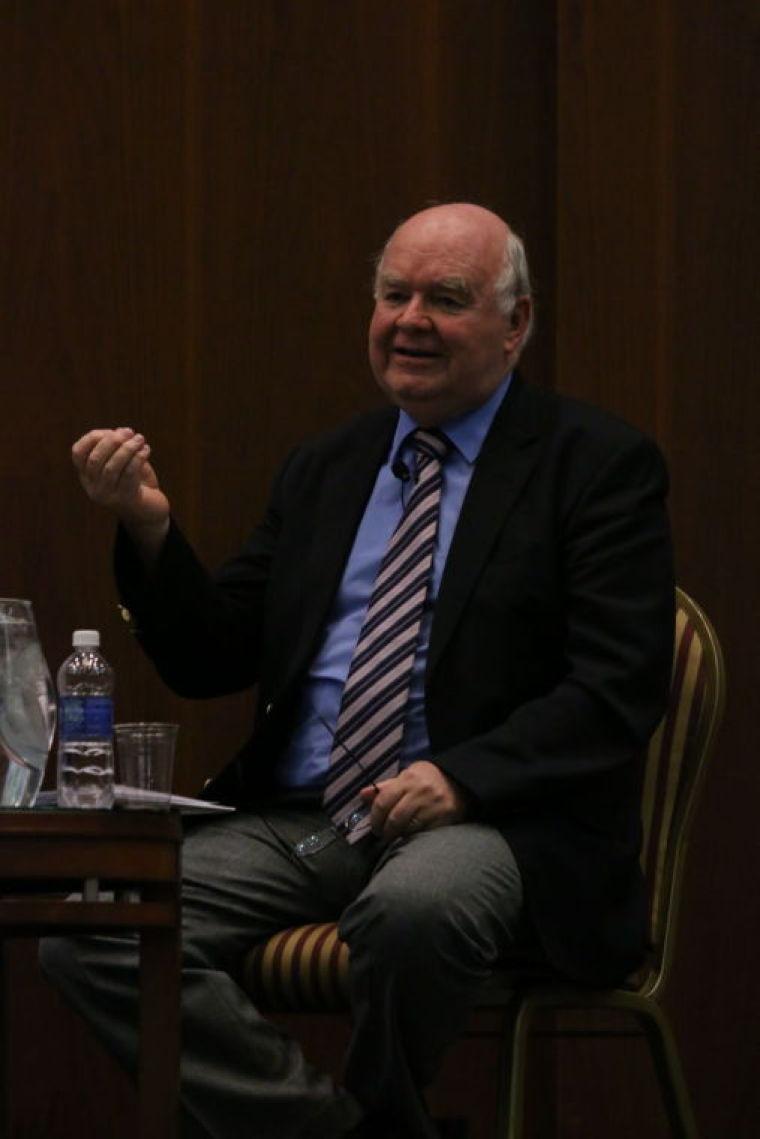John Lennox, a professor of mathematics at Oxford University, attempted to resolve the apparent conflict between religious faith and science at the McKimmon Center Wednesday night.
Greg Reeves, Professor of chemical engineering and chapter leader of Ratio Christi Student Apologetics Alliance, introduced Lennox.
Reeves said the forum bridged a “connection between the hardest questions and deepest beliefs” surrounding religion and science. Reeves added that the point of the lecture was for audience members to challenge their thinking about the two topics by observing the perspectives of other people.
Reeves started the forum by interviewing Lennox with thought provoking questions about difficulties between believing in God and supporting modern science.
When Reeves asked about the controversy between faith and science, Lennox said that there isn’t a problem between the two because God created the universe so that science could exist.
“Science isn’t at war in belief in God.” said Lennox. “Science points beyond itself to a Creator.”
Lennox also provided some historical examples to help prove his point.
He said Sir Isaac Newton was motivated to believe in God more through the scientific discoveries he made. Scientific discoveries can support religious faith because, according to Lennox, a lot of scientific discoveries point toward the small probability of the universe being created spontaneously.
“The more Newton discovered how the world worked, the more he fell in love with God,” Lennox said.
Lennox said the real conflict between religion and science is really concerns the world views of faith, such as atheism and naturalism, or the belief that only natural forces, as opposed to supernatural ones, operate in the universe and how they conflict with theism.
According to Lennox, science often leads to an atheistic world view due to a history of scientific data and experiments that seems to contradict religion, such as carbon dating, which can cause people to doubt their faith.
Lennox also addressed the idea of spontaneity and nothingness when the forum opened for questions from the crowd.
He said that, while Newton and other scientists created laws governing life on Earth, their laws all have to account for a conscious, human interaction.
Lennox said Newton’s laws of motion do not move anything, but people have to physically move those objects to activate motion. Likewise, matter spontaneously expanded to create the universe, according to the big bang theory, but it doesn’t explain who or what started it.
Lennox said that it is hard to redefine nothing and that’s what some atheist believe created the universe.
In moments of critical thinking, Lennox said that universities are great for researching and discovering one’s beliefs. He said universities grant the opportunity to discuss one’s faith and challenge beliefs in order to gain a better understanding.
Audience members later asked questions concerning God’s apparent disregard for human suffering, and how that contradicted the image the an all-loving deity.
Lennox said that the reason for suffering in the world was “judgment from God to cleanse people from sins.”
However, Lennox said he can see why this subject can cause people to doubt their belief in God. However, he said that if there was no judgment, Hitler would get away with what the Holocaust.
Lennox said that he traveled to Europe and Russia in the purpose of spreading the Gospel. For Lennox, it wasn’t about whether people viewed the gospel as helpful or not, but it was about “exposing the truth.”
Lennox also discussed the topic of religion.
According to Lennox, evolution depends on the existence of a fine-tuned universe, that could have been created by a deity or without one. Either way, the evidence surrounding evolution causes people to question their beliefs, which is a good thing, Lennox said.
Apparently, Lennox’s challenge to get audience members to doubt their beliefs worked.
“It rally encouraged me to think about why I believe in what I believe,” said Veeranya Janjarasskul, senior in business administration.
The event also strengthened the religious beliefs of some audience members.
“This forum was a reflection of my faith and it gave me a lot of new ideas to deal when talking to nonbelievers,” said Rui Yang, a graduate student.








